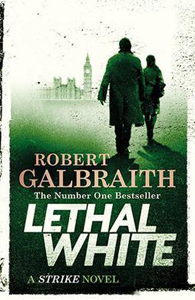As with the “Harry Potter” series, the Cormoran Strike novels keep getting bigger as they go along. The fourth book from Robert Galbraith (the alias for J.K. Rowling), 2018’s “Lethal White,” easily passes the 600-page mark.
I’m more accustomed to Agatha Christies where a 300th page is unheard of. But while Rowling likely had to put more time and precision into this novel than the previous three, it doesn’t suffer for it.
As happened about midway through the “Potter” saga, Rowling goes into British government in “Lethal White.” She recognizes the absurdity of the inner workings – the way officeholders view themselves as a special class, above the people rather than serving the people. Their titles are status symbols as much as they are jobs.

“Lethal White” (2018)
Author: J.K. Rowling, writing as Robert Galbraith
Series: Cormoran Strike No. 4
Genre: Mystery
Setting: London and countryside, 2012
The excellent characterizations start with the puffy-lipped, spittle-spewing Jasper Chiswell, who is the Minister of Culture but notably is not shown doing anything along those lines. He hires Strike and partner Robin – whose undercover skills fascinatingly come to the fore here – to investigate his blackmailer, skeezy fellow official Geraint Winn.
Chiswell intrigue doesn’t fizzle
The one time Rowling goes into specifics of governmental law, I’m not sure I buy it. She suggests a key item in the plot is constructed and shipped, rather than being built on-site by the people who need the item. You’ll see what I mean when you get to that point. For the most part, though, I believe the actions – both contemporary and in the past – of this huge roster of mid- and low-level movers and shakers.
We dig into the dysfunctional and multi-branched (due to multiple marriages) Chiswell (pronounced “Chizzle”) family, especially after a murder occurs, raising the stakes and intrigue. We explore members of the Real Socialist party. And hanging over the proceedings is a child murder that may have happened decades ago; mentally ill Billy Knight claims he witnessed this killing when he was a kid, but his details are quite consistent for a tall tale.
Also, the 2012 London Olympics are happening. Editors generally don’t like authors to date their stories so precisely, but Rowling (who dated the previous entry, “Career of Evil,” around the Royal Wedding of 2011) has enough cachet to break some rules.
Any sacrifice of timeliness doesn’t bother me. Although Rowling might’ve had the Olympics play a bigger role in the story, the backdrop does show that widely chronicled culture carries on amid Strike’s and Robin’s pavement-pounding.
Interestingly, Strike is a headline-grabbing celebrity himself – having dated socialite Charlotte for 16 years and then having solved three fascinating murders. By being associated with Strike, Robin also finds herself in the tabloids. Rowling (herself a celebrity, of course) continues to illustrate how what seems like a heightened reality to an outside observer can become daily life for the people living it.

Strike and Robin are open books – but not always to each other
Encouraging a reader to like and understand the sleuths, Rowling goes into Robin’s panic attacks and details the cracks in her marriage to Matthew. Strike, meanwhile, despite being such a well-rounded character, is a workaholic at his core.
But we love him for it. In one amusing segment, he reads a harsh breakup email from his latest girlfriend, Lorelei, then compartmentalizes it and quickly returns his focus to the Chiswell case. At a glance, he treats his girlfriends badly. But because we know his inner workings, we know he is honest with them – just out of step with the mainstream in the way he puts logic before emotions.
Rowling maintains a work-life balance, if you will, throughout “Lethal White.” We get some of the case, some of the detectives’ personal lives; and sometimes they overlap (especially with Robin, who can’t compartmentalize as masterfully as Strike). Wonderfully, we learn what Strike is thinking about Robin’s current state (and vice versa), and often they are wrong, despite knowing each other well; that’s true to life.
Just as the mystery is nearing the finish line, it seems Rowling is putting Robin’s life ahead of the case, something I mildly scoffed at. But it turns out to be a neat plotting trick. Big revelations come in a rather melodramatically intense, life-on-the-line fashion. But since I was as stupidly faked out as the detectives, I have to allow it.
The author reminds us that the detectives’ lives remain merely the spice; hardboiled detecting is prominent in the flavor profile. The mystery is well-clued and layered, grounded in plausibility, with many side paths that bear investigation even if they don’t all bear fruit. “Lethal White” unspools like a real, complex murder case might.
Sleuthing Sunday reviews the works of Agatha Christie, along with other new and old classics of the mystery genre.

